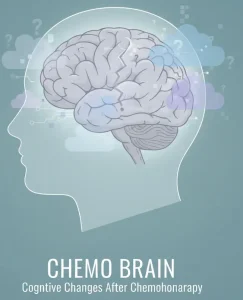Overview
Chemo brain, also known as chemotherapy-related cognitive impairment, refers to changes in memory, concentration, and thinking abilities experienced by some people during or after cancer treatment. Although commonly associated with chemotherapy, similar cognitive symptoms can also occur with radiation therapy, hormone therapy, immunotherapy, or cancer itself. Chemo brain is usually temporary, but in some individuals, symptoms may persist for months or years and affect daily functioning and quality of life.
Symptoms
Chemo brain symptoms can vary in severity and may fluctuate over time. They often affect mental clarity rather than physical abilities.
Common symptoms include:
-
Difficulty concentrating or focusing
-
Memory lapses, especially short-term memory
-
Trouble finding the right words
-
Slower thinking or processing speed
-
Difficulty multitasking
-
Feeling mentally foggy or disorganized
Other possible symptoms include:
-
Confusion
-
Difficulty learning new information
-
Reduced attention span
-
Increased frustration or irritability
Causes
The exact cause of chemo brain is not fully understood, and it is likely due to a combination of physical, emotional, and treatment-related factors.
Possible causes include:
-
Effects of chemotherapy on brain cells
-
Inflammation or immune system activation
-
Hormonal changes related to cancer treatment
-
Fatigue and sleep disturbances
-
Stress, anxiety, or depression
-
Anemia or nutritional deficiencies
Cancer itself may also contribute to cognitive changes, even before treatment begins.
Risk Factors
Certain individuals may be more likely to experience chemo brain.
Key risk factors include:
-
High-dose or prolonged chemotherapy
-
Combination cancer treatments
-
Older age
-
Pre-existing cognitive issues
-
Fatigue or chronic pain
-
Emotional distress such as anxiety or depression
Not everyone undergoing cancer treatment develops chemo brain, and symptoms vary widely among individuals.
Complications
Chemo brain can interfere with daily activities, work performance, and emotional well-being.
Potential complications include:
-
Difficulty returning to work or managing complex tasks
-
Reduced confidence in cognitive abilities
-
Increased stress or emotional distress
-
Strain on personal and professional relationships
While not life-threatening, the condition can significantly affect quality of life if not addressed.
Prevention
There is no guaranteed way to prevent chemo brain, but certain strategies may help reduce its impact and support cognitive health.
Preventive and supportive measures include:
-
Getting adequate rest and managing fatigue
-
Staying mentally active with puzzles, reading, or memory exercises
-
Using planners, notes, and reminders for organization
-
Engaging in regular physical activity as tolerated
-
Managing stress through relaxation techniques
-
Discussing symptoms with healthcare providers for tailored support
Early recognition and supportive care can help individuals adapt to cognitive changes and improve daily functioning during and after cancer treatment.
Advertisement

